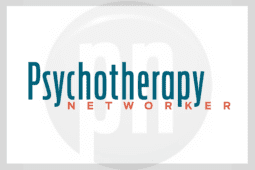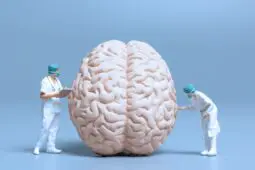Anxiety & Depression
Left to Our Own Devices
Sorting Through The Bewildering World Of Therapeutic AppsMobile apps offer tools for everything from depression, social anxiety, and binge eating to phobias, OCD, postpartum problems, and substance abuse recovery. In... Read more
The Empathy Gap
Digital Culture Needs What Talk Therapy OffersConditioned by the experience of life on the screen, clients today find it harder to concentrate on face-to-face conversation. They may not even see its value... Read more
Is VR a Game Changer?
Virtual Reality in TherapyTo date, virtual reality’s most visible therapeutic role has been in the treatment of phobias and other conditions where it’s served as an adjunct to... Read more
Food and Mood
What Every Therapist Needs to Know about NutritionWhat therapists should know about nutrition and the food-mood connection. An interview with Joan Borysenko. Read more
High-Stakes Therapy
Eating Disorders Can Be a Matter of Life or DeathWhen it comes to eating disorders, therapy can be a matter of life and death. Read more
Living Brave
From Vulnerability to DaringWith millions of people having seen her TED talks and read her books, researcher and bestselling author Brené Brown is a phenomenon. But aside from her... Read more
Transcending Trauma
Learning How to Guide Devastated Clients Toward GrowthIn the early days of the trauma field, clients were seen as one-dimensional bundles of dysfunction and pain, who needed to relive their trauma before progress... Read more
Today, with all the presumed advances therapists have made in reducing mental suffering from previously untreatable conditions, is there a solution, a cure, a... Read more
Upside-Down Psychotherapy
Breaking the Rules with Our OCD ClientsIt’s now clear that much of what therapists do for people suffering from OCD actually worsens the problem. Providing empathic reassurance, rational... Read more
Learning to Manage the OCD Bully
A Therapeutic OdysseyAn OCD sufferer describes the frustrating stops and starts and misdirections of her circuitous search for help in escaping the maze of her family of origin and... Read more
OCD and Children
It’s a Family AffairOCD in children can operate like a kind of cult leader, demanding acceptance of an extreme view of a perilous reality and offering solutions that can’t be... Read more
Moving Through Grief
How Kübler-Ross’s Model Can Help Clients HealHow Kübler-Ross’s stage model of dealing with loss can help grieving clients heal. Read more
Have SSRIs Gotten a Bad Rep?
The Author of "Listening to Prozac" Thinks SoIn his latest book, Peter Kramer argues that medications represent the best, most effective tool for fighting the bleakness of depression. Read more
Ten Best-Ever Anxiety-Management Techniques
There are Effective Alternatives to MedicationThe sensations of doom or dread or panic felt by anxiety sufferers are truly overwhelming. The very same sensations, in fact, that a person would feel if the... Read more
Detoxifying Criticism
How to Help Clients Gain PerspectiveAn innovative way of working with people who are hypersensitive to criticism. Read more
Supporting the Overwhelmed Child
Sometimes It Just Takes TimeA school counselor’s patient work with a sad, uncommunicative young boy demonstrates what a difference just being there can make. * Commentary by Janet... Read more
Losing Our War on Stress
It’s time to reconsider our approachPsychologist Kelly McGonigal believes that stress isn’t the public health menace it’s usually made out to be—our compulsion to avoid it is often the... Read more
A Cure for the Yips
Brainspotting and Performance BlocksTraumatic experiences are often the root of athletic and other kinds of performance blocks. Read more
Helping Therapy Clients Cope with the Reality of Death
Clinical Wisdom to Combat Fear, Anxiety, and Grief at the End of LifeFor 17 years, managing responses to death has become part of my work, whether originally my intention or not. I’ve aspired to helping families hang tough... Read more
Pornography on the Rise: A Growing Mental Health Problem
Wendy Maltz on the Need to Address Porn Addiction as a Public Health ThreatNearly 40 million Americans visit Internet porn sites at least once a month. Not surprisingly, concerns about the effect of porn on individuals and... Read more
A Brain Science Strategy for Overwriting Traumatic Memories
Creating Juxtaposition Experiences to Relieve Trauma SymptomsBrain science offers powerful guidance for freeing clients from the distress triggered by disturbing implicit memories. Read more
VIDEO: Moving Forward When Treatment Seems to Make a Problem Worse
Chris Germer on shifting the focus from fixing a problem to embracing it with compassionWhat someone resists persists. It’s a paradoxical dynamic that you’ve probably seen in the course of your own clinical work. In this video, Chris explains... Read more
Functional Family Therapy: A New Road Map for Behavioral Change
Using FFT to Get Parents and Kids Motivated, Allied, and Committed to ChangeOver the years, I’ve found that I’ve needed a solid, research-backed clinical model, which would guide me in sessions and keep me grounded during... Read more
What the Financial Crisis Reveals About Our Psyche and Values
Confronting our Definitions of Wealth in the Therapy RoomThe current economic crisis may be no more than a rather large bump in the golden road of endlessly self-renewing American prosperity. Still, it's hard not to... Read more
Putting Clients with Asperger's Syndrome on the Path to Success
How Adding Brain Science to Therapy Normalizes Living with Asperger'sAdults with Asperger's syndrome often behave as if they were confused actors walking onto a stage and being the only ones who don't know the lines or the plot... Read more
VIDEO: Treating Anxiety
David Burns on the Paradox of ResistanceDavid Burns explains how he addresses outcome and process resistance in a way that quickly leads to meaningful and lasting change with clients. Read more
IFS for Self-Compassion
Some Forms of Self-Love Are Harder than OthersIFS founder Dick Schwartz believes a genuine state of self-compassion entails a journey into multiple parts of yourself that may include the good, the bad, the... Read more
Inside the Heart of Healing
When Moment-to-Moment Awareness Isn't EnoughAs the mindfulness movement sweeps through our field, many therapists are discovering that traditional contemplative practices grounded in detached... Read more
The 5 Myths of Self-Compassion
What Keeps Us from Being Kinder to Ourselves?Research proves false many of the common myths about self-compassion that keep us trapped in the prison of relentless self-criticism. Read more
VIDEO: Depression Is Not a Disease, It’s a Wake-Up Call
James Gordon on Healing without AntidepressantsDepression is not a disease, so the promise of antidepressants as a cure just doesn’t hold water. That’s the assessment of James Gordon, M.D. and he should... Read more
























